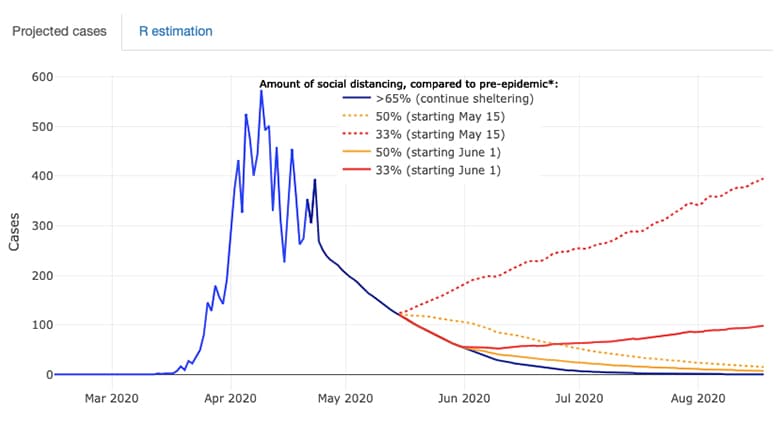A Path Through the Unknown: How CHOP’s Unique Model for Predicting COVID-19 Spread is Helping the United States Navigate the Pandemic
Having made it their life’s work to help children, a team of doctors and scientists at Children’s Hospital of Philadelphia is re-channeling years of meticulous research to help a different group:
All of us.
Since its founding in 2008, the CHOP research juggernaut PolicyLab has built a body of studies demonstrating how factors such as ZIP code and family income level affect a child’s health.
As its name suggests, the group aims to guide policymakers. And their findings consistently show that to be effective, policies must be nuanced. Not every child is the same, or even close.
Turns out, PolicyLab’s one-size-most-definitely-does-not-fit-all approach is incredibly useful during a pandemic.
When is it safe to reopen?
Researchers at CHOP’s PolicyLab have created a unique modeling tool, called COVID-Lab: Mapping COVID-19 in Your Community, to predict the spread of the virus.
Their model is different because of its precision: It predicts COVID-19 transmission for 260 counties across the U.S. through the summer, using factors including population density and social distancing, and temperature and humidity. The publicly available maps offer insight into how different levels and timeframes of reopening will affect COVID-19 spread, county by county.
The maps are easy to understand – they help us see where extreme caution is necessary, and where a faster return to normal may be safe.

Image: Sample COVID-Lab projection data for Philadelphia
One glance at the model for Los Angeles could convince a skeptical resident that an extra two weeks of social distancing would be worth the lives saved. Meanwhile, the map of low-risk Allegheny County might suggest restaurants and other businesses could gradually re-open.
“With our model, we hope to help city leaders and public health officials build more targeted strategies for reopening communities,” says PolicyLab Director David Rubin, MD, MSCE.
Sowing calm
The model is updated in real time and closely watched by government and industry groups. Rubin and team are frequently cited by media outlets such as The New York Times, the Washington Post, and CNN.
For a public weary of uncertainty, CHOP’s county-by-county model is a blueprint for a way forward – an impartial, data-based beginning of a plan. By making the models available to everyone, CHOP is helping tamp down fear and encourage calm and caution.
“When you are panicked and terrified, you can cut corners,” says Paul Offit, MD, a vaccine pioneer and CHOP infectious disease specialist who recently co-authored a New York Times opinion piece with Rubin.
All minds on deck
As always at CHOP, depth of experience and collaboration between experts in disparate areas has led to excellence. Rubin’s collaborators include Greg Tasian, MD, MSC, MSCE, a urologic surgeon who has studied the link between rising temperatures and disease incidence, and Jing Huang, PhD, a biostatistician who has built patient-by-patient predictions for best courses of treatment for devastating pediatric conditions. And there are many more COVID-19-focused minds at CHOP – all helping us find our way through the pandemic.